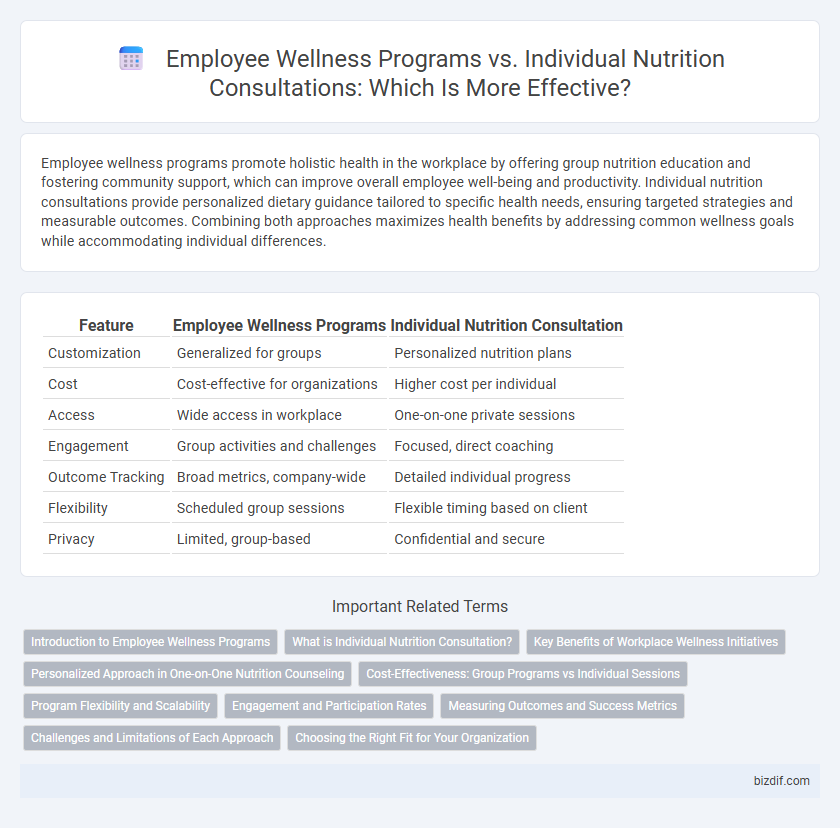Employee wellness programs promote holistic health in the workplace by offering group nutrition education and fostering community support, which can improve overall employee well-being and productivity. Individual nutrition consultations provide personalized dietary guidance tailored to specific health needs, ensuring targeted strategies and measurable outcomes. Combining both approaches maximizes health benefits by addressing common wellness goals while accommodating individual differences.
Table of Comparison
| Feature | Employee Wellness Programs | Individual Nutrition Consultation |
|---|---|---|
| Customization | Generalized for groups | Personalized nutrition plans |
| Cost | Cost-effective for organizations | Higher cost per individual |
| Access | Wide access in workplace | One-on-one private sessions |
| Engagement | Group activities and challenges | Focused, direct coaching |
| Outcome Tracking | Broad metrics, company-wide | Detailed individual progress |
| Flexibility | Scheduled group sessions | Flexible timing based on client |
| Privacy | Limited, group-based | Confidential and secure |
Introduction to Employee Wellness Programs
Employee Wellness Programs integrate nutrition consultation as a strategic component to enhance overall employee health, productivity, and reduce healthcare costs. These programs often offer group nutrition education, personalized assessments, and ongoing support tailored to workplace demographics. Research indicates that comprehensive wellness initiatives can lead to improved dietary habits and significant reductions in absenteeism compared to individual consultations alone.
What is Individual Nutrition Consultation?
Individual nutrition consultation involves personalized assessment and guidance tailored to an employee's unique dietary needs, health goals, and medical history. This approach allows for targeted nutrition strategies that address specific conditions such as diabetes, hypertension, or weight management, leading to more effective health outcomes. Personalized nutrition plans crafted during these consultations enhance employee well-being, productivity, and long-term health benefits beyond generalized wellness programs.
Key Benefits of Workplace Wellness Initiatives
Workplace wellness initiatives boost employee productivity by reducing absenteeism and improving overall health through structured nutrition education and group activities. These programs create a supportive environment that encourages healthy lifestyle choices, leading to enhanced team morale and decreased healthcare costs for the organization. Employees benefit from accessible resources, personalized health assessments, and ongoing motivation, fostering sustained behavioral change beyond individual consultations.
Personalized Approach in One-on-One Nutrition Counseling
One-on-one nutrition counseling offers a highly personalized approach, tailoring dietary plans and lifestyle recommendations to individual health goals and medical histories. Unlike broad employee wellness programs that provide generalized advice, individual consultations address specific nutritional needs, enhancing effectiveness and adherence. This focused strategy promotes sustainable behavior change and optimal health outcomes through customized support and continuous interaction with a nutrition expert.
Cost-Effectiveness: Group Programs vs Individual Sessions
Employee wellness programs offer a cost-effective approach by delivering nutrition consultation to multiple participants simultaneously, reducing per-person expenses compared to individual sessions. Group programs leverage shared resources and foster peer support, enhancing engagement while maintaining budget efficiency. Individual consultations provide personalized guidance but often incur higher costs due to tailored attention and longer session durations.
Program Flexibility and Scalability
Employee wellness programs offer scalable nutrition consultation that can accommodate large workforce populations through structured group sessions and digital platforms, enhancing overall program flexibility. Individual consultations provide personalized nutrition advice tailored to specific health needs but may require more resources and time, limiting scalability. Implementing a hybrid approach leverages program flexibility while ensuring personalized care, optimizing employee health outcomes efficiently.
Engagement and Participation Rates
Employee wellness programs typically achieve higher engagement and participation rates compared to individual nutrition consultations due to their structured group settings and workplace integration. Group challenges, peer support, and incentives within wellness programs foster consistent involvement and motivate employees to adopt healthier behaviors collectively. Individual consultations, while personalized, often see lower adherence rates as they rely heavily on self-motivation and scheduling flexibility outside of the work environment.
Measuring Outcomes and Success Metrics
Employee wellness programs utilize aggregate data such as reduced healthcare costs, absenteeism rates, and overall productivity improvements to measure outcomes, providing a broad perspective on organizational health impact. Individual nutrition consultations focus on personalized metrics like body mass index (BMI) changes, blood glucose levels, and patient adherence to dietary plans, offering detailed insights into personal health progress. Comparing these success metrics highlights the complementary nature of both approaches in evaluating nutritional interventions at the population and individual levels.
Challenges and Limitations of Each Approach
Employee wellness programs often face challenges such as limited personalization, reduced engagement due to generic content, and difficulty in addressing diverse dietary needs within a large group. Individual consultations provide tailored nutritional guidance but can be resource-intensive, costly, and less scalable for organizations aiming to support many employees. Balancing group-based interventions with personalized support is essential to optimize outcomes and overcome the limitations inherent in each approach.
Choosing the Right Fit for Your Organization
Employee wellness programs offer scalable nutrition solutions that promote collective health education and foster a supportive environment, enhancing overall productivity and reducing healthcare costs. Individual nutrition consultations provide personalized dietary assessments and tailored interventions that address specific health concerns, improving employee engagement and long-term wellness outcomes. Selecting the right fit depends on organizational size, budget, and wellness goals, with hybrid models combining broad impact and personalized care for maximum effectiveness.
Employee Wellness Programs vs Individual Consultation Infographic

 bizdif.com
bizdif.com